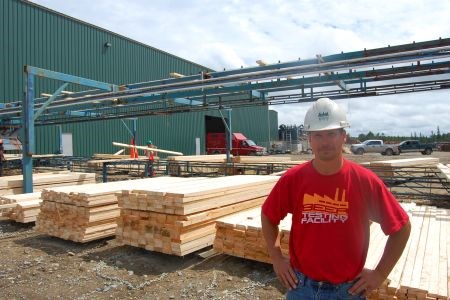More than a year after the completion of a nearly decade-long plan to establish a new forestry mill in Kirkland Lake, Rosko Forestry is seeing success amidst challenging times.
In February 2009, milling began at its sprawling site on the outskirts of town, and the company now features 25 staff, cutting rough green lumber to custom sizes up to 32 feet in length.
From one-inch-by-one-inch to ten-by-ten and anything in between, the two-line mill prepares specific requests for things such as fence boards, track ties, and barn timbers. These are sold into domestic markets, primarily Ontario and Quebec.
“It’s going well,” says Russ Williams, general manager of Rosko Forestry. “Prices could be better, for sure, but that’s a sign of the times.”
Owned by Joe and Terry Rosko, the company is just one of many in the Rosko Group, which also includes a long-time logging operation employing up to 50 in the Temiskaming Forest, as well as Team Rosko, a retailer of snowmobiles, ATVs and boats.
Joe’s dream of operating a sawmill first came to pass in 2004 when Rosko Forestry was asked to manage Tembec’s Kenogami mill, which the industry giant closed just one year later.
As a self-proclaimed “stump-to-dump” forest operations company, offering anything from forest management planning to operations and harvesting, “it only made sense” to take the next step and become a “stump-to-market” firm, says Williams.
Undeterred and determined to diversify, Rosko developed the land on which the mill currently sits, servicing it with water, sewer, gas before purchasing an entire sawmill from Gerardville, Que.
Staff dismantled it, transported it to Kirkland Lake, and re-assembled it on its current location in 2008, which now has roughly 24,000 square feet spread across three buildings.
The first lumber was cut in early 2009, while equipment upgrades continue to be implemented through the site.With no official wood allotment, Rosko Forestry buys its wood on the open market and from private lands, and its flexibility in the range of products it can make is key to its viability, says Williams.
This has led the bulk of its customer base to be made up of wholesalers and secondary manufacturers looking to fulfill specific contracts with specialty cut wood.
No part of the wood is wasted, as the chips are sold to Abitibi for hogfuel, while the sawdust goes down the road to Northland Power for its co-generation plant.
This kind of outside interest continues to rise, paving the way for future plans to hire even more staff. The potential is there to acquire a kiln and planer to allow for even greater flexibility as company officials consider the viability of entering the secondary manufacturing market.
“As we get into it, what else do we want to do?” asks Williams. “The wood goes off the line and goes to the clients, but can we turn it into a widget ourselves?”
While the mill represents a victory for the company, it certainly hasn’t come without struggle.
The heart of the work on the mill took place through the worst of the recession, meaning that obtaining funding for the project was a “tough, tough challenge.”
While Williams is hesitant to identify spending on the site, the Northern Ontario Heritage Fund Corporation provided $1.8 million towards the mill construction in 2007.
Additional help for accessing lending was also provided through any number of community partners.
This difficulty also led to some thought being given to stopping altogether, though the five years of preparatory work that had led to that point ensured that the project had to move forward.
“We’ve had a heck of a time,” says Williams, who trails off and shrugs after asking, “Would we have done it knowing that the economy was going to take that turn?”
Still, he acknowledges that the hard work has been worth the effort, and that the lessons learned through the hardships will help temper the company through the future.
It’s this kind of attitude that’s being infused through many forestry-related firms in the region, whose entrepreneurial spirit is lifting their fortunes, says Lorne Hillcoat, manager of Temiskaming Development Fund Corporation.
He points to the rising number of companies looking to make a fresh start in the industry, or others who had closed shop upon hard times and have since reopened their doors.
“Much of the industry has struggled, no question, but you can really see that it’s a lot of these smaller companies who are making a real go of it in our region,” says Hillcoat. “It’s that kind of independent business tack that you really see a lot of out here, and while there’s some that don’t pan out, there are a lot that do, and they do well.”




